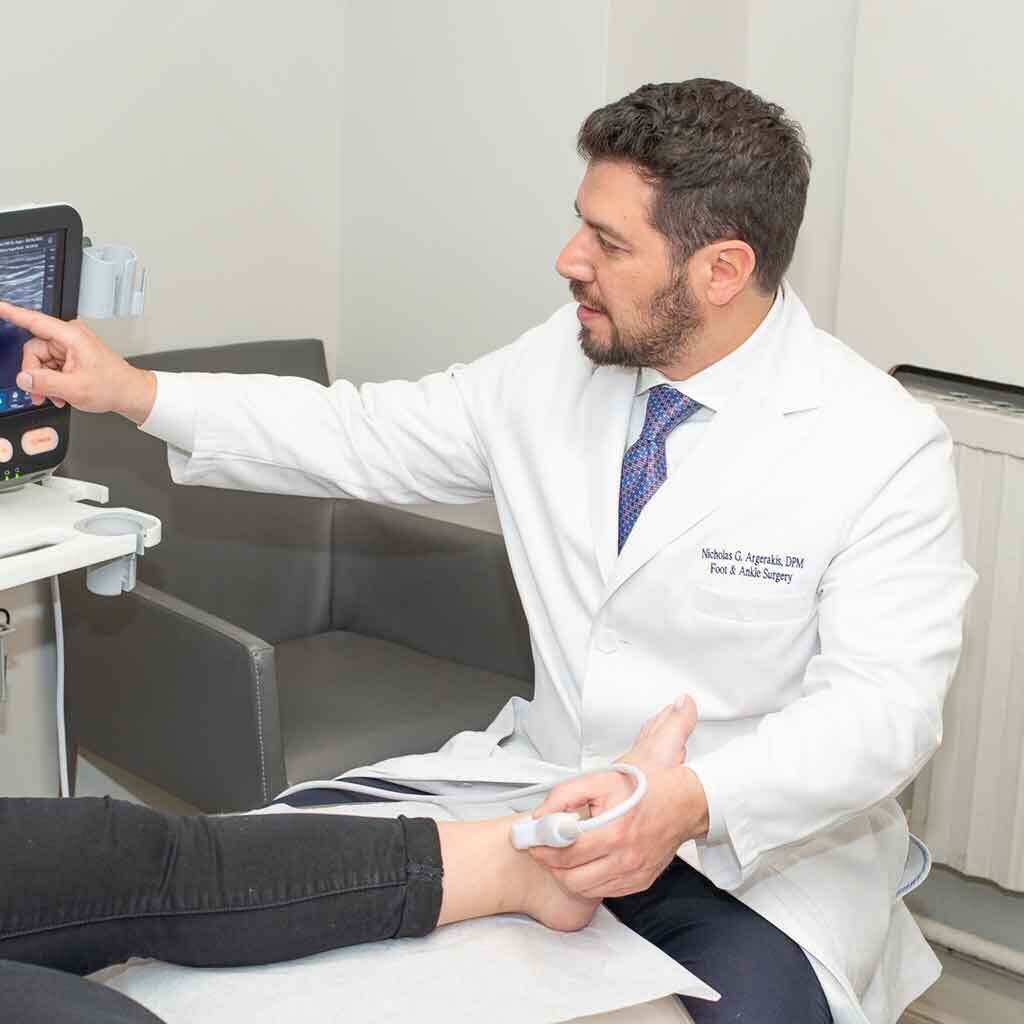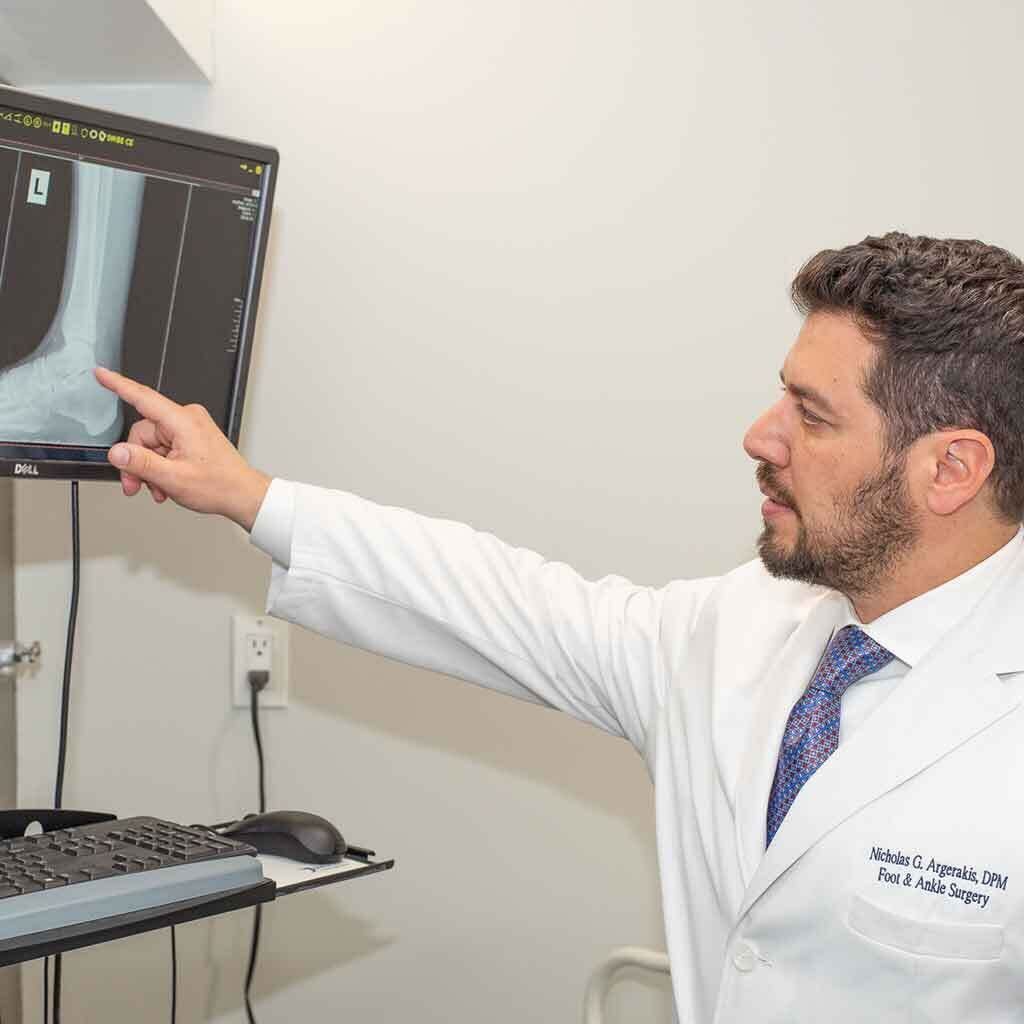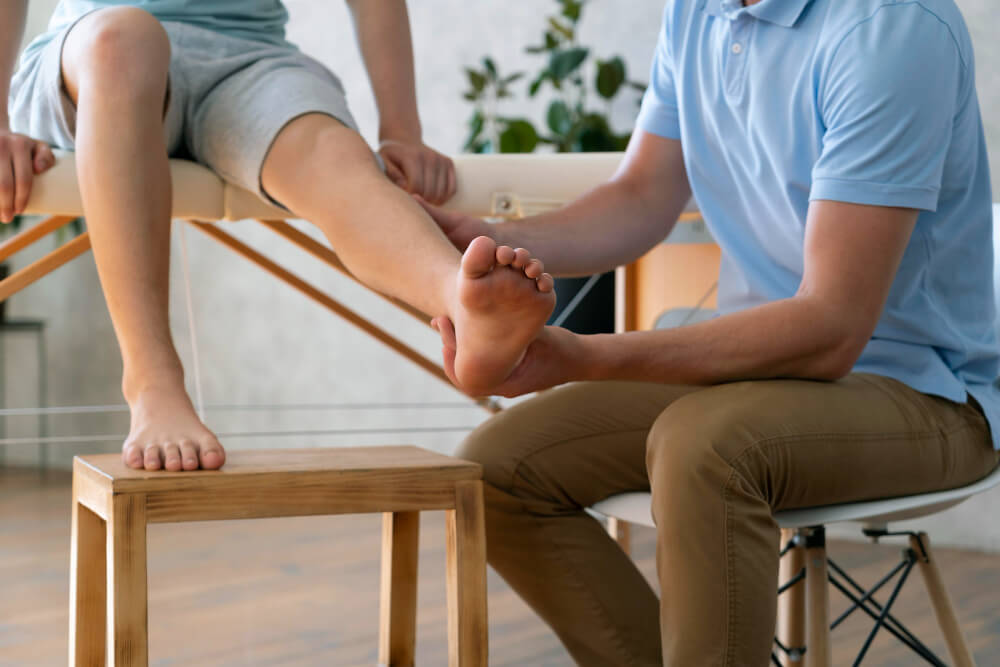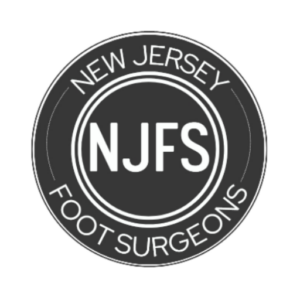Plantar fasciitis can limit your mobility and cause frustration, but it doesn’t have to define your life. Imagine overcoming this condition and fully enjoying your favorite activities. Under the care of Dr. Nick Argerakis, DPM, FACFAS, a board-certified foot and ankle surgeon, our clinic uses advanced technologies and techniques to tailor a surgical strategy that meets your unique needs.
Call us at (732)-320-9173 to book an appointment and take the first step toward relief.
Key Takeaways:
- Plantar fasciitis is a painful condition caused by inflammation of the plantar fascia and can result from overuse, foot mechanics issues, or poor footwear.
- Non-surgical treatments such as custom orthotics, physical therapy, night splints, corticosteroid injections, and EPAT can relieve pain and support recovery.
- Surgical options include plantar fascia release, gastrocnemius recession, Tenex procedure, EPF, and laser plantar fascia release, providing effective solutions for severe cases.
- New Jersey Foot Surgeons use advanced technology and personalized treatment plans to restore mobility and alleviate pain.
- Early intervention and professional care are essential. Call (732)-320-9173 to start your recovery journey.
Understanding Plantar Fasciitis
Plantar fasciitis is a painful condition where the plantar fascia, a thick band connecting the sole to the heel, becomes inflamed. This often causes sharp heel pain, especially when taking the first steps in the morning or after prolonged inactivity.
Common Causes of Plantar Fasciitis
- Overuse or Repetitive Strain: Common in athletes and individuals with jobs requiring prolonged standing or walking.
- Foot Mechanics Issues: High arches, flat feet, or uneven walking patterns can stress the plantar fascia.
- Obesity or Weight Gain: Extra weight increases pressure, leading to stretching and inflammation.
- Unsupportive Footwear: Poorly fitting or unsupportive shoes, such as high heels or thin sandals, contribute to the condition.
- Age: Most common in individuals aged 40–60.
- Occupation: Jobs requiring long periods of standing can exacerbate symptoms.
Symptoms of Plantar Fasciitis
- Heel Pain: Sharp pain, especially in the morning or after rest, that worsens with prolonged activity.
- Pain During Activity: Typically subsides with rest.
- Tenderness or Stiffness: Felt along the arch or heel.
- Difficulty Walking or Standing: Severe pain may limit mobility.
- Swelling: Occasional mild inflammation near the heel.

Non-Surgical Treatment Options
Custom Orthotics
Custom orthotics are specially designed inserts that support the foot’s arch and alleviate pressure on the plantar fascia. These inserts are tailored to an individual’s foot shape, promoting natural foot function and preventing overuse. Worn during daily activities, they provide consistent support throughout the day.
Physical Therapy
A personalized physical therapy regimen strengthens the muscles supporting the foot and ankle, reducing pain and increasing mobility. Effective exercises include calf stretches, towel stretches, and lower-leg strengthening routines. These activities aid in recovery and relieve plantar fasciitis symptoms.
Night Splints
Night splints keep the plantar fascia stretched during sleep, reducing morning pain and stiffness. These splints are an effective option for many patients and can be customized to suit individual needs.
Corticosteroid Injections
Corticosteroid injections provide short-term relief for moderate to severe pain. Administered precisely at the source of discomfort, these injections alleviate pain and enable better mobility. They are part of a broader treatment plan and not a standalone solution.
Extracorporeal Pulse Activation Technology (EPAT)
EPAT is a modern, non-invasive treatment that promotes tissue regeneration and improves blood flow to the affected area. This technique expedites healing and offers long-term pain relief with minimal downtime, typically requiring several sessions over a few weeks.

Surgical Treatment Options
Plantar Fascia Release
This minimally invasive procedure involves making small incisions in the plantar fascia to reduce tension. It is performed using advanced diagnostic tools and modern surgical techniques to ensure effective results with minimal recovery time.
Gastrocnemius Recession
Tight calf muscles, particularly the gastrocnemius, can contribute to plantar fasciitis. Gastrocnemius recession stretches the calf muscles, relieving pressure on the plantar fascia and enhancing foot function. This procedure is particularly effective for patients with inflexible calf muscles.
Tenex Procedure
The Tenex procedure, or percutaneous tenotomy, removes scar tissue and damaged tendon fibers without affecting healthy structures. This precise technique minimizes complications, providing immediate pain relief and sustainable recovery.
Endoscopic Plantar Fasciotomy (EPF)
EPF involves cutting tightened areas of the plantar fascia through a minimally invasive endoscopic approach. This advanced technique reduces postoperative pain and accelerates recovery compared to traditional open surgery.
Laser Plantar Fascia Release
Laser plantar fascia release is a cutting-edge microsurgical technique that isolates and severs tightened tissue within the plantar fascia. This method offers faster recovery and superior results compared to conventional surgical procedures.
Conclusion
At New Jersey Foot Surgeons, we provide effective solutions for chronic plantar fasciitis. From non-surgical treatments like custom orthotics and physical therapy to advanced surgical options such as laser plantar fascia release and gastrocnemius recession, our comprehensive approach ensures personalized care. Contact us today at (732)-320-9173 to restore your mobility and live pain-free.


